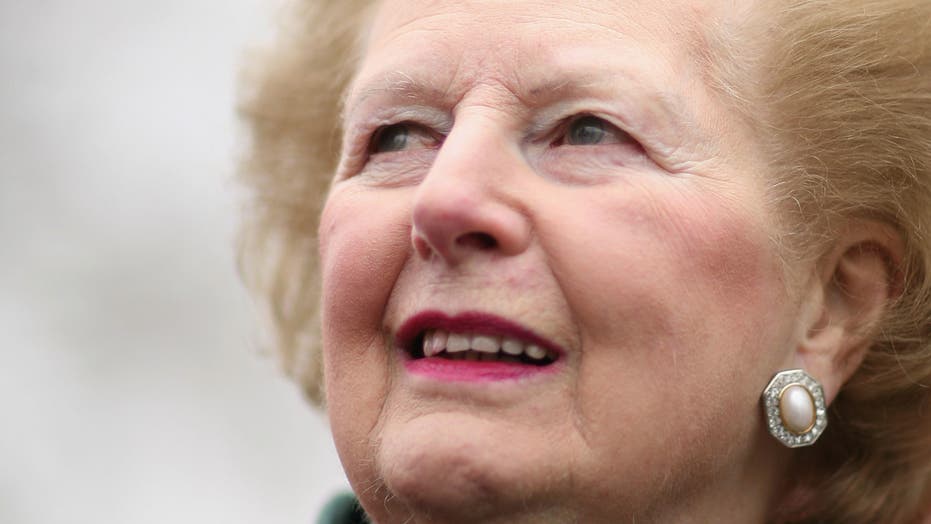Margaret Thatcher, Britain’s first – and still only – female prime minister, died of a stroke at the age of 87 on Monday.
Nicknamed the “Iron Lady” of the 1980s, Thatcher, led Britain under her conservative conviction for three terms from 1979 to 1990 becoming one of the world’s most influential political leaders of the 20th century.
But Thatcher’s legacy of reviving Britain’s economy from the grasp of socialist policies may have never happened had she not fought Argentina in the Falklands War in 1982.
Thatcher's popularity surged after the victory in the three-month battle, and her government easily won reelection in 1983. The risky military decision jumpstarted the public’s confidence in her leadership and she led the country until 1990, transforming Britain’s economy with her free-market policies.
“Nothing remains more vividly in my mind, looking back on my years in 10 Downing Street, than the 11 weeks in the spring of 1982 when Britain fought and won the Falklands War,” Thatcher said in her memoir entitled The Downing Street Years.
The dispute over the sovereignty of the Falkland Islands, or Malvinas, reached its peak on April 2, 1982 when Argentina’s junta military government invaded the islands. The war ended on June 14, 649 Argentines, 255 British troops and three islanders.
When Argentina's military junta seized the remote Falklands Islands from Britain in 1982, she did not hesitate even though her senior military advisers said it might not be feasible to reclaim the islands.
“She simply would not allow Britain to be pushed around, particularly by military dictators,” said Ingham, who recalls the Falklands War as the tensest period of Thatcher's three terms in power. When diplomacy failed, she dispatched a military task force that accomplished her goal, despite the naysayers.
"That required enormous leadership," Ingham said. "This was a formidable undertaking, this was a risk with a capital R-I-S-K, and she demonstrated her leadership by saying she would give the military their marching orders and let them get on with it."
In deciding on war, Thatcher overruled Foreign Office specialists who warned her about the dangers of striking back. She was infuriated by warnings about the dangers to British citizens in Argentina and the difficulty of getting support from the U.N. Security Council.
"When you are at war you cannot allow the difficulties to dominate your thinking: you have to set out with an iron will to overcome them," she said in her memoir, "Downing Street Years." ''And anyway what was the alternative? That a common or garden dictator should rule over the queen's subjects and prevail by fraud and violence? Not while I was prime minister."
Thatcher's determination to reclaim the islands brought her into conflict with Reagan, who dispatched Secretary of State Alexander Haig on a shuttle mission to London and Buenos Aires to seek a peaceful solution even as British warships approached the Falklands.
Private papers released last month by the Thatcher archive at Cambridge University show that the British leader's closest advisers urged her to negotiate over the islands' future rather than go to war. And the Reagan administration backed a peace plan that called for Britain to drop its insistence on self-determination for the islanders a stance that led Thatcher to say Anglo-American friendship had brought her "into conflict with fundamental democratic principles."
Thatcher was especially stung by Reagan's stance. A Peruvian peace plan backed by the United States called for a cease fire but insisted the U.K. give up its insistence on the Falklands remaining British.
Her hurt and anger shine through a hand-written letter to Reagan, her strongest international ally.
Collins said Thatcher felt betrayed and "profoundly let down" by Reagan.
The letter Thatcher drafted was never sent. A toned-down version was posted, but by then Argentina had rejected the peace plan.
The relatively quick triumph of British forces revived Thatcher's political fortunes.
“She proved to the British people that one could be proud of their country again, and that Britain does stand for something, and that Britain is willing to defend itself,” said Luke Coffey, a Margaret Thatcher Fellow at the Heritage Foundation, told Fox New Latino.
“People in Britain said we should be listening to her, if she got it right on the Falklands War, she will get it right on other issues.”
Success in the Falklands War set the stage for a pivotal fight with the National Union of Miners, which began a 51-week strike in March, 1984 to oppose the government's plans to close a number of mines.
Thatcher’s legacy and close relationship with Reagan even inspired American politicians, including presidential hopeful Sen. Marco Rubio (R-Fla).
“From a young age, Margaret Thatcher understood what limited government and free enterprise could do for people and helped modernize Great Britain’s economy,” Rubio, whose parents left Cuba before Fidel Castro came to power, said in a statement “Her passion for freedom and in advocating for the dignity of people trapped behind communism’s Iron Curtain helped bring about the Soviet Union’s end.”
Texas Sen. Ted Cruz said Thatcher will be remembered for breaking down barriers.
"Her magnificent intellect and unwavering work ethic helped her become Britain's first and only female prime minister," Cruz said, "an ascent that wasn't a matter of breaking through the glass ceiling, but simply refusing to acknowledge its existence."
Based on reporting by the Associated Press.
Follow us on twitter.com/foxnewslatino
Like us at facebook.com/foxnewslatino





